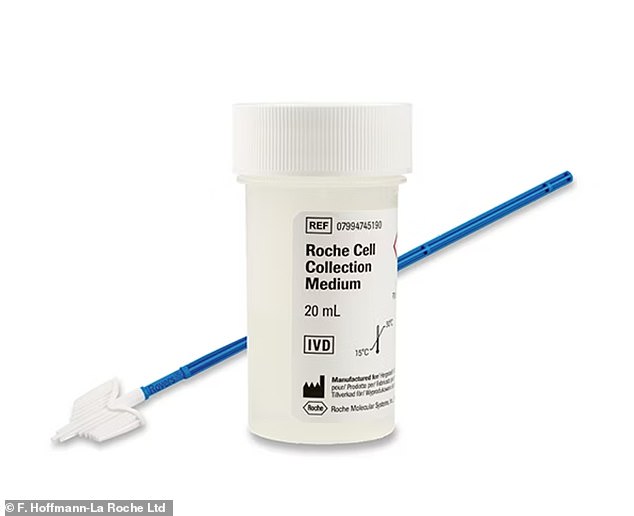Starting this autumn, women will be able to get a simple swab test for cervical cancer in a major improvement to women’s health care.
The cervical cancer screening test, known as the Pap test, is so uncomfortable that women avoid going to the doctor for it.
Approximately 8 million women who should be screened for cancer have not seen a doctor in the past five years.
Delaying treatment means more women are unknowingly infected with the human papillomavirus (HPV), the main cause of cervical cancer, and the longer a diagnosis is delayed, the harder it is to treat the cancer.
Currently, the in-clinic test involves inserting a cold, duck-billed metal instrument called a colposcope into the vagina to open it up and allow doctors to swab cells from the cervix.
Not only is it physically uncomfortable, it can also be emotionally distressing, especially for those who have experienced sexual abuse.
But new models of cervical cancer screening have emerged that allow women to avoid the speculum altogether.

Roche’s newly approved HPV test allows women to swab themselves, rather than lying down with their feet in stirrups. The sample is then sent to a laboratory that tests for HPV, which is responsible for 95 percent of cervical cancer cases.
In May, the FDA approved two self-sampling cervical cancer testing tools developed by pharmaceutical companies Roche and Becton Dickinson.
The test is done in a doctor’s office, like a traditional Pap smear, but instead of lying down with your feet in stirrups while a doctor performs the uncomfortable test, the new test allows women to walk into a room, swab their vaginal canal themselves, and hand over the sample in the same way they would give a urine sample to a doctor.
In a traditional Pap smear, a doctor swabs the cervix, places the sample on a glass slide, and sends it to a cytopathologist, a specially trained laboratory specialist who examines the cells under a microscope.
The main purpose of a Pap test is to identify abnormal cells in the cervix that may indicate cervical cancer or precancerous conditions.
The newly approved self-collected samples would be sent to a laboratory that can test samples from the vaginal wall rather than the cervix.
The laboratory will test the sample for the presence of the strains of HPV most likely to cause cervical cancer.
Dr. Karen E. Knudsen, CEO of the American Cancer Society, said“Nearly all cervical cancers are caused by persistent infection with certain types of HPV.”
“Self-sampling will expand access to testing, reduce barriers and give more people the opportunity to detect, treat and ultimately survive cancer.”
The laboratory will communicate the results to the ordering physician, who will meet with the patient to discuss the results.
Detecting possible HPV infection allows doctors to test for precancerous conditions and determine whether a patient is at risk for developing cervical cancer.
Dr. Sheeva Ghofrani, obstetrician-gynecologist and fellow of the American College of Obstetrics and Gynecology, said: said“Integrating self-sampling with testing for individual strains of HPV represents a major advancement in cervical cancer screening.”
“Self-collection increases access to testing; [the Becton, Dickinson and Company test] Healthcare providers can determine the specific HPV strains present in a sample, more accurately identifying and treating high-risk individuals and avoiding unnecessary treatment for low-risk women.”



A speculum is a cold metal instrument shaped like a duck’s beak that is inserted into the vagina to open it up so that your doctor can take a swab of cells from your cervix.
But a growing number of women are challenging the ingrained notion that women’s health care involves pain and that they must accept it.
Detecting possible HPV allows doctors to test for precancerous changes in cervical cells and determine whether a patient is at risk for developing cervical cancer.
Researchers hope to take this innovation a step further, introducing at-home testing that would eliminate the need for awkward and potentially painful doctor’s visits.
It works in the same way as colon cancer screening kits: A woman takes a vaginal swab, packages it up and mails it to a lab to be tested for HPV. If the test is positive, the patient and doctor can discuss next steps.
The Pap test has remained largely unchanged since its introduction in the 1940s. It was a groundbreaking medical advancement that helped reduce the incidence of cervical cancer by 70 percent compared to the pre-test era.
But a growing number of women are challenging the ingrained notion that women’s health care involves pain and that they must accept it.
The IUD, a dreaded form of birth control that’s notoriously painful, is in the midst of being revamped.
Experts at Swiss technology company Aspivix have invented an alternative method that uses suction to manipulate the cervix, reducing pain by three-quarters in studies.
Menopausal symptoms are also receiving belated attention, and several menopausal-focused drugs are in development.
Last year, the FDA approved the first drug specifically to treat hot flashes caused by menopause, which roughly 80 percent of women experience.

